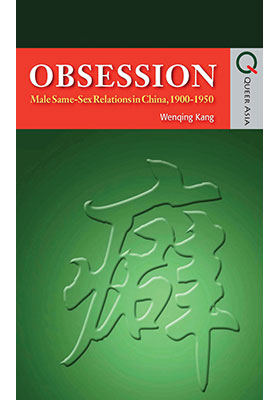Obsession
Male Same-Sex Relations in China, 1900–1950
(癖:中國男同性關係 (1900–1950))
ISBN : 978-962-209-981-4
March 2009
204 pages, 6″ x 9″
Ebooks
Also Available on
This is the most serious study to date on the topic of male same-sex relations in China during the early twentieth century, illuminating male same-sex relations in many sites: language, translated sexological writings, literary works, tabloid newspapers, and opera. Documenting how nationalism and colonial modernity reconfigured Chinese discourses on sex between men in the early twentieth century, Wenqing Kang has amassed a wealth of material previously overlooked by scholars, such as the entertainment news and opinion pieces related to same-sex relations published in the tabloid press. He sheds new light on several puzzles, such as the process whereby sex between men became increasingly stigmatized in China between the 1910s and 1940s, and shows that the rich vocabulary and concepts that existed for male-male relations in premodern China continued to be used by journalists and writers throughout the Republican era, creating the conditions for receiving Western sexology.
“Can sex between men threaten the emergence of a virile modern nation? In the early twentieth century, that is what the urban Chinese reading public was told. Drawing upon tabloid gossip, popular and highbrow fiction, Beijing opera, and sexological writings, Wenqing Kang explores the varied domains where this discussion erupted. He provides a deft and observant guide to a semicolonial world and its debates about what it meant for men to desire men. Obsession is a model of how to think about sex in a historically nuanced fashion.” —Gail Hershatter, University of California, Santa Cruz
“Wenqing Kang examines the Chinese tabloid press of the 1920s and ’30s to analyze the relation between conceptions of homosexuality and concerns regarding national vigor. We are treated to first-hand accounts of visits to brothels and opium dens, testimony from male prostitutes, and the chronicle of an affair between an actor specializing in female roles and a former Minister of Justice. A great read for anyone interested in the history of sexuality in modern China.” —Sophie Volpp, University of California, Berkeley





